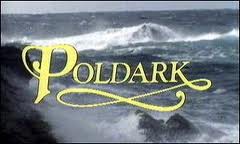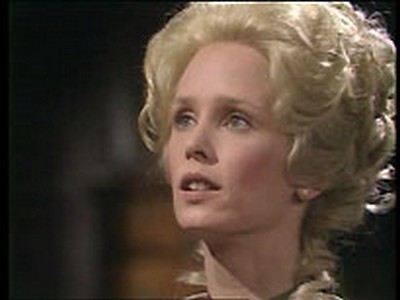Poldark: A Cornish Maxiseries If You’re Craving Pasties and Freckled Bosoms
by Danielle Roderick

So maybe you have been a sucker for long-form melodramas of questionable production value. Maybe you watched all 54 episodes of the Korean medieval soap opera Dae Jang Geum (which asserted itself so boldy on your Netflix queue that you and your cohabitant exchanged serious words). Maybe you wept like a baby through every episode of the second season of The Duchess of Duke Street because it insists on unhappiness. Maybe you think Downton Abbey, with all of its gloss and cinematic foppery, is actually costume melodrama weak sauce, because they have it so easy with real set pieces, and film and budgets and modern times that don’t make the production look like a taped play your English teacher is spending a whole week showing you.
So maybe, you are surprised when Netflix Instant hands you Poldark, all 16 episodes of life in 1780s Cornwall. The film is so old that when you go to “full screen” it can only stay as a larger square. The opening credits are of waves splashing on cliffs, a soprano howling, and the name “Poldark” in the best dashing yellow font that was available at the time.
You think, yes. You think, how has this never found me before? Why did no public library have the VHS of this when I was in middle school? How lucky am I that this treasure has been saved for this particularly exhausting late summer of 2011?
The story is about Ross Poldark, an English Captain who has been off fighting in the Revolutionary War. He comes home to Cornwall to find that his girlfriend has decided to marry his cousin, and everybody thought he was dead. His dad also died, and left him nothing but a crap house and some drunk servants. In a mere 16 hours, you get to watch five years of artistrocratic struggle, village life, romances, smuggling, sick children, and what it looks like to have scorbutus. There’s a love triangle, a bunch of politics, a street urchin who becomes a Lady, pilgrims, and all the stuff that makes the past so fun to read about and watch. This particular version was made in 1975, starring a bunch of people I had never heard of, including a leading lady named Angharad Rees. Her name in the credits became a special guest all its own.
So, without further ado, here are 14 reasons to not watch Poldark.

1. This woman never closes her mouth.
2. “Poldark” is not a name that elicits passion, romance, or nobility. They would have been better off calling this “The Winds of Cornwall!” or “The Pasties of Revolution” or “Doctors and Rich Ladies!”
3. The show does not go more than 45 seconds without something bigtime happening. So much that you start laughing out loud, and you don’t really care what happens to who. You end up thinking, “OK, the baby is dead. And the mine exploded! And that guy drank too much brandy and held a pistol to his head, what!” Sixteen episodes, and you will never cry, even if you are a chump for some BBC costume drama weepery. Again, see Duchess of Duke Street. See Berkeley Square.
4. A village guy kills his wife, but he’s somehow a good guy who deserves help. This is mostly because the wife was a slutty actress who didn’t know her place.
5. Poldark isn’t crushworthy. When he has his shirt off, you want him to put it back on. He’s noble, but in an asshole way. He can tell you some stuff, but nobody can tell him nothing. You wouldn’t set your friends up with him, because, while he’s successful, and has his standards, he kind of also has his head up his ass. Maybe like Mark Ruffalo in The Kids Are All Right?
6. Poldark is a superdick! He often ruins his fortunes just because he wants to prove that he is a better dude than everybody else in lace collars.
7. Poldark is elitist. For all of his help to his villagers, he hates people who reach outside of their station. He can’t stand the rich villains in town, not because they’re villains, but because they come from blacksmithing stock.
8. Poldark really likes to tell people he’s an Englishman, and definitely not Cornish.
9. He cheats on his wife, and then makes her take him back by the really dumb argument that “all that matters is right now” and right now, “aren’t they happy?”
10. He sleeps with his servant because she is 16 and looking all doe-eyed in the firelight. And, the next day, he fires her.
11. An abusive and alcoholic character is considered loyal and ultimately beloved, even though he nearly kills his wife in a drunken rage.
12. The whole series suggests a defense for the landowner system, suggesting that everything would have been idyllic if villagers were always more or less parented by kind landowners like Poldark who understood their ways. When they revolt, it’s not because they’ve been oppressed for centuries, but because entrepreneurial types (uppity blacksmiths) don’t understand the old ways of keeping a peasant class tame. There’s an argument that the original aristocracy wasn’t in it for the money as much as for the tradition. While Poldark argues for better prisons, and works against the super rich, it is always penned by the fact that he’s fighting the ignorance of the new money, and not the huge class divide in general.
13. It’s a bleak show, more about how crap life was. Nobody is really happy in this thing, even the happy people.
14. Like many a ’70s melodrama, things look a little … dusty? Shabby? Like a fresh pair of character shoes was all that the costumers ordered before they raided the local high school drama wardrobe.
Reason to watch Poldark.
1. All of the above
And finally, maybe you are listening to NPR on your drive home, and you hear a story about the London riots. A dressmaker’s shop has been ruined. She says “they are feral rats,” describing the rioters, the disgust ripe in her voice, and it is so perfectly close to the accent and 16-episode mindsoak you have been watching all week, that you are elated for a moment. You feel lucky. Happy! Dramatic! The historical confusion is breathtaking. And then you say that modern catch-all, “fuuuck,” groaning it, tired, weary enough to satisfy you that you care, and you feel like you have done enough, driving back to a street with no smugglers, riots, scorbutus, or gout.
Danielle Roderick lives in Los Angeles, and writes as Carla Fran at Millicent and Carla Fran.